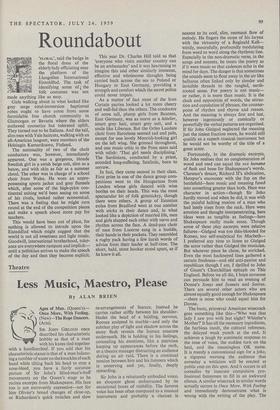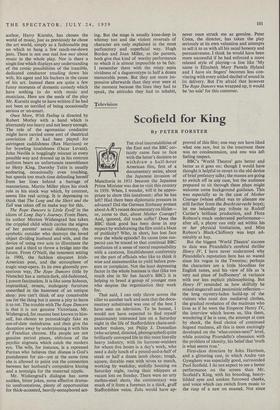Theatre
Less Music, Maestro, Please
By ALAN BRIEN Ages of Man. (Queen's)— , ----., Once More, With Feeling. (New)—The Rope Dancers. (Arts).
SIR JOHN GIELGUD once described his characteristic hobble as that of a man with his knees tied together with a handkerchief. If you add that his characteristic stance is that of a man balanc- ing a tumbler of water on the knuckles of each hand while tilting back his head to stop a nose-bleed, you have a fairly accurate picture of Sir John's blind-man's-buff movements on the Queen's stage as he recites excerpts from Shakespeare. His face too is not extrovertly expressive—not for him Olivier's broad changes of close-up, or Richardson's quick twitches and slow re-arrangements of feature. Instead he carries rather stiffly between his shoulder- blades the head of a balding, nervous, Roman sculpted in marble—and only the subtlest play of light and shadow across the stony flesh reveals the human creature underneath. He is holding in his feelings, concealing his emotions, like a patrician keeping up appearances before the mob, or a theatre manager distracting an audience during an air raid. There is a continual tension between him and his listeners which is unnerving and yet, finally, deeply rewarding.
Sir John is a reluctantly embodied voice, an eloquent ghost embarrassed by its occasional bouts of visibility. The famous voice has been often compared to a musical instrument and probably a clarinet is nearest to its cool, slim, resonant flow of melody. He fingers the stops of his larynx with the virtuosity of a Reginald Kell— wittily, mournfully, profoundly modulating from word to word along the rhythmic line. Especially in the non-dramatic verse, in the songs and sonnets, he treats the poetry as if it were music so that cadences echo in the mind for days. The danger is that sometimes the sounds seem to float away in the air like balloons often linked only by slender and invisible threads to the tangled, earth- rooted sense. For poetry is not music— or rather, it is more than music. It is the clash and opposition of words, the attrac- tion and copulation of phrases, the counter- point of rhythm and rhyme and reason. And the meaning is always first and last, however ingeniously or comically or powerfully the verbal patterns are organised. If Sir John Gielgud neglected the meaning just the tiniest fraction more, he would still qualify as a superb musical instrument but he would not be worthy of the title of a great actor.
Fortunately, in the dramatic excerpts, Sir John realises that no conglomeration of wood and reed can equal the vox humana of flesh and bone for Shakespeare's words, Clarence's dream, Richard II's abdication, Hotspur's encounter with the fop on tho battlefield—here music and meaning fused into something greater than both. Here was character in action—though Sir John hardly moved and when he did, it was with the painful halting motion of a man who had lately risen from the rack. Here were emotion and thought interpenetrating, here ideas were as tangible as feelings—here Shakespeare really made sense. Though some of these play excerpts were relative failures—Gielgud was too thin-blooded for Romeo, too self-analytical for Macbeth- 1 preferred any time to listen to Gielgud the actor rather than Gielgud the musician. But whatever piece he chose, he enriched. Even the most hackneyed lines gathered a certain freshness—and old anti-patriot and republican though I am, I thrilled to John of Gaunt's Churchillian epitaph on This England. Before we all die, I hope someone can persuade him to read an evening of Donne's Songs and Sonnets and Satires. There are several other actors who are almost equally good enough for Shakespeare —there is none who could equal him for Donne.
The basic, primeval American wisecrack goes something like this—'Who was that lady I saw you with last night? Whistler's Mother?' It has all the necessary ingredients, the barbless insult, the cultural reference, the delayed weak punch at the end. It achieves a laugh by automatic response to the tone of voice, the sudden turn on the heel, and the meaningless OK name. It is merely a conventional sign for a joke, a signpost warning the audience that someday a witticism will be erected at public cost on this spot. And it occurs in all comedies by insecure compulsive pro- fessional funnymen to fill in an awkward silence. A similar wisecrack in similar words actually occurs in Once More, With Feeling and immediately demonstrates what is wrong with the writing of the play. The
author, Harry Kurnitz, has chosen the world of music, just as previously he chose the art world, simply as a fashionable peg on which to hang a few reach-me-down jests. There is not one real bon mot about music in the whole play. Nor is there a single line which displays any understanding of the comic possibilities of the irascible, dedicated conductor treading down his wife, his agent and his backers in the cause of his art. Instead there are quite a few funny moments of domestic comedy which have nothing to do with music and musicians. Here are the seeds of the play Mr. Kurnitz ought to have written if he had not been so terrified of being occasionally serious or un-smart.
Once More, With Feeling is directed by Robert Morley with a hand which is alternately too heavy and not heavy enough. The role of the egomaniac conductor might have carried some sort of theatrical conviction if it had been played for astringent caddishness (Rex Harrison) or for brawling loutishness (Oscar Levant). John Neville is bogglingly miscast in every possible way and dressed up in his rostrum uniform bears an unfortunate resemblance to Hetty King. Dorothy Tutin is usually endearing, occasionally even touching, but spends too much time defending herself from her lines behind a barrage of mannerisms. Martin Miller plays his stock role in his stock way which, by contrast, seems like real acting. It is depressing to think that The Long and the Short and the Tall was taken off to make way for this.
The Rope Dancers is Little Eyolf in the idiom of Long Day's Journey. From Ibsen, its author Morton Wishengrad has taken the crippled child which carries the stigma of her parents' sexual disharmony, the symbolic outsider who destroys the loved object dividing husband and wife, and the device of using two acts to illuminate the past and a third to throw a bridge into the future. From O'Neill, the tenement setting in 1900, the feckless eloquent Irish- American poet, and the atmosphere of tragic soap-opera. In its own gloomily pre- tentious way, The Rope Dancers (title by Nietsche) has a certain dark, old-fashioned, Lyceum fascination. It is like some hideous, impractical, ornate, mahogany furniture unearthed in the basement of an antique shop: you can't think of any conceivable use for the thing but it seems a pity to leave it to rot. The trouble with The Rope Dancers is that it is not genuine Victoriana. Mr. Wishengrad, for reasons best known to him- self, has chosen to painstakingly fake an out-of-date melodrama and then give the deception away by underpinning it with bits of Freudian chrome. His people are not genuine period pieces, oblivious of the psychic stigmata which catch the modern eye. The wife, for instance, is a repressed Puritan who believes that disease is God's punishment for sin—yet at the same time she is allowed to point out the connection between her husband's compulsive kissing and a nostalgia for the maternal nipple.
Mr. Wishengrad's dialogue has some sudden, bitter jokes, some effective drama- tic confrontations, plenty of opportunities for thick-accented, heavily-semaphored act-
ing. But the stage is usually knee-deep in whimsy too and the violent reversals of character are only explained in the most perfunctory and superficial way. Hugh Burden and Joan Miller, as the parents, both give that kind of worthy performance to which it is almost impossible to be fair. I remember them with the misty sepia vividness of a daguerrotype in half a dozen memorable poses. But they are more im- pressive afterwards than they ever were at the moment because the lines they had to speak, the attitudes they had to inhabit, never once struck me as genuine. Peter Cotes, the director, has taken the play seriously at its own valuation and attempts to sell it to us with all his usual honesty and persuasiveness. I think he would have been more successful if he had enforced a more relaxed style of playing—a line like 'My name is Elizabeth Mary Pamela Hyland and I have six fingers' becomes less con- vincing with every added decibel of sound in its delivery. But I'm afraid that however The Rope Dancers was wrapped up, it would be `no sale' for this customer.







































 Previous page
Previous page